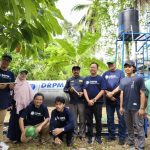FTMD ITB Strengthens Connectivity and Builds the Future of Aviation
Bandung – As the world’s largest archipelago, Indonesia, with over 17,000 islands, heavily relies on air transportation to connect its regions. The air transport sector has become one of the key pillars in Indonesia’s economic, social, and cultural development, playing a crucial role in the movement of goods and people, strengthening tourism and trade, and facilitating access to public services, especially in remote areas.
On Tuesday, September 24, 2024, the Faculty of Mechanical and Aerospace Engineering at the Bandung Institute of Technology (FTMD ITB) held a seminar titled Expert Talk: Achievements of the Air Transportation Sector 2015-2024. The event aimed to evaluate the sector’s achievements over the past decade and provide strategic input for stakeholders.
ITB’s Vice Rector for Research and Innovation, Prof. Ir. I Gede Wenten, M.Sc., Ph.D., highlighted in his opening remarks that air transportation plays a central role in advancing a vast archipelagic nation like Indonesia. “Air transport is vital in supporting the national economy. It is also key to boosting tourism, reducing the isolation of remote regions, and enhancing inter-regional connectivity,” said Prof. Wenten.
This statement was echoed by Indonesia’s Minister of Transportation, Dr.(H.C.) Ir. Budi Karya, in a keynote speech delivered via video. He emphasized that the development of the air transportation sector symbolizes national progress. “Air transportation bridges remote areas, spurs industrial growth, and enhances national connectivity,” said Minister Budi.
To generate a well-rounded evaluation, the event featured leading aviation experts, including Ir. Polana Banguningsih Pramesti, M.Sc. (President Director of Airnav Indonesia), Air Marshal (Ret.) Chappy Hakim (Chairman of the Indonesian Air Power Study Center), Gerry Soejatman (Aviation Analyst), and Prof. Dr. Ir. Tatacipta Dirgantara, M.T. (Dean of FTMD ITB), with Maria Assegaf (News Anchor of TV One) as the moderator.
One of the main achievements highlighted was the adjustment of the Flight Information Region (FIR) in Indonesia and Singapore’s airspace. The successful implementation of the Air Bridge Program, which helped reduce the disparity in basic commodity prices in 3TP regions (Disadvantaged, Outermost, Frontier, and Border Areas), also received special attention. However, amidst these advancements, new challenges have emerged with rapid technological developments.
FTMD ITB Dean, Prof. Tatacipta Dirgantara, emphasized that technological disruption will reshape the future of the air transport industry. “We face significant challenges with the disruption of digital technology and new energy sources. Digitally-based air traffic management systems and flight automation will be the main focus of industry development in the coming years,” stated Prof. Tata. While these technologies are expected to improve operational efficiency and flight safety, they will also require major adjustments from industry players.
To tackle these challenges, Prof. Tata underscored the importance of human resource readiness. FTMD ITB has already partnered with the Ministry of Transportation and leading universities in France through a double degree master’s program to produce experts in aviation technology. “Advanced technology will be useless without skilled professionals to operate it,” he stressed.
He expressed optimism that through synergy between academia, industry, and government, Indonesia can compete on the global stage. “The challenges of digitalization and renewable energy do indeed require significant investment, but with careful planning, we can overcome these obstacles and lead Indonesia’s air transportation sector toward a more advanced future,” he concluded.
This seminar reaffirmed that collaboration between the government, academia, and industry will be key to addressing technological disruptions and enhancing Indonesia’s competitiveness in the global air transportation sector.







